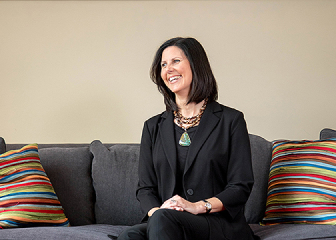How did you guys meet?
Dave Bhattacharya
We met through the board, and we've developed this really fantastic friendship because even though we kind of have very similar thought processes, we live completely separate lives.
Dave, what brought you from Memphis to Chattanooga?
Dave Bhattacharya
My job – I’m trained as a pediatric surgeon. Seven years ago, we’d just had our first baby and we were moving [back to Memphis], but at the last minute, I felt like I could have a better impact in Chattanooga. There was a lot of room for opportunity here, and we've made some big strides in children's healthcare in the last 10 years or so.
Lorie, what was your introduction to the Community Foundation?
Lorie Runge
I was on the original board of the Women's Fund, which was housed at the Community Foundation in its early stages. Surprisingly, outside of the administrative infrastructure they provided to the Women's Fund, I didn't have any intersection with their work. It wasn't until I became a member of the first cohort of the WE Project that I was exposed to their strategic work and grantmaking.
The WE Project is composed of female leaders; it was a diverse crowd and included a lot of women I did not know. The WE Project really opened my eyes to the concept of “two Chattanoogas.”
What is the goal and purpose of the Foundation’s Strategic Initiatives Committee?
Dave Bhattacharya
Simply put, the committee is looking for strategic opportunities for the Community Foundation to make an impact.
Lorie Runge
Chattanooga is a great town, but it can be a better town. In my lifetime, I've seen Chattanooga evolve– from the beautification of our downtown to our use of the outdoors – some great progress has happened here in my lifetime. But a divided Chattanooga is something that I got a look into at the WE Project. I also got a look into what the Community Foundation does for donors. More importantly, they were also in the process of shifting their focus to “How can we help Chattanooga? How can we change that situation?” That shift is what brought me to this committee.
How do you guys think about identifying exactly what those issues are?
Dave Bhattacharya
I'm new to the role of committee chairman, but when I walk around Chattanooga, I see a lot of opportunities for more parity. There are people who don't have a voice in Chattanooga, and if you don't have a voice, then your lot in life is pretty well set unless somebody can help bulldoze barriers for you. Some of the things that we work on, from eviction prevention and housing security, to debt relief and civil court reform, could not happen unless somebody takes the time to think about other people.
Ultimately, I think everybody should have the same opportunity from the time that you're born, to be whatever you want: an astronaut, a high school football coach, whatever that may be, but there shouldn't be imperceivable barriers that prevent you from doing that.
Lorie Runge
I think the Community Foundation is well poised to not necessarily do all of that work, but to bring parties together that have the expertise and the ability we need to help others make it happen. The Foundation is not just a convener, but that is a big role they play: coordinating resources to come together towards a particular goal. In this case, the goal is economic mobility.
It's really important to me personally that we're helping everyone, in all sectors of the community. Whether we’re working on housing or addressing the barrier of consumer debt—which is some of the work we're focused on right now—it’s important that the solutions are beneficial to a majority of people, not just one sector.
How will you feel the committee's work has been successful in a year, or five years?
Dave Bhattacharya
As it relates to the civil court reform work, right now, people are uninformed about their own rights and expectations. You can have an eviction process against you, or you can have a debt collector come against you, and you may never even know about it. Not everybody has legal representation and not everybody is aware that their wages [could get] garnished. This also really impacts small business owners.
Lorie Runge
I think eventually, you're going to hear about somebody who might have otherwise been on the street but now has some secure housing and has been able to get a full-time job, and has been able to exercise their legal rights because they understood them. If it works long enough, you'll see less of a strain on the court system and you will see a confidence in the justice system where everyone will have equal access to justice and full understanding of their rights. I'll be excited to see that happen.
What does that mean for Chattanooga? What does that mean for Hamilton County? I'm hopeful that we have the resources and the sustained community support and interest to follow it long enough to find out and see if it works – and I think it will.








